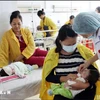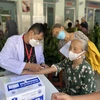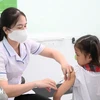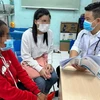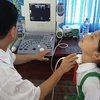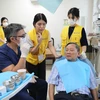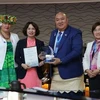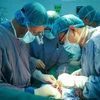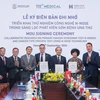The Ministry of Health (MOH) and the World Health Organisation (WHO) kicked off the “First Embrace” campaign in the National Obstetrics and Gynaecology Hospital in Hanoi on July 17 to promote immediate skin-to-skin contact between mother and child to save thousands of newborn lives in the country.
The campaign highlights early essential newborn care, or EENC – a package of actions and interventions to address the most common causes of newborn death or disease, such as prematurity, low birth weight and severe infections such as pneumonia or diarrhoea.
According to the WHO, the “First Embrace” refers to sustained skin-to-skin contact between the mother and her newborn shortly after the baby is born. This simple act transfers lifesaving warmth, placental blood and protective bacteria from the mother to the newborn.
Skin-to-skin contact should be followed by proper clamping and cutting of the umbilical cord with sterile instruments. Breastfeeding then initiates naturally at feeding cues, such as drooling, tonguing and biting of the hand.
“First milk” is particularly important, as it provides newborns with essential nutrients, antibodies and immune cells to protect them against diseases.
EENC can be performed in all birth settings without the need for complicated preparations or expensive technology. Early essential newborn care can thus also be applied in district and community health centres in remote or hard-to-reach areas in Vietnam with a disproportionately high newborn deaths.
Vietnam has made great strides over the past two decades in reducing neonatal death rates, meeting the United States’ Millennium Development Goal Target to reduce child mortality.
In 2012, more than 17,000 infants died within the first month of life.
Many medical workers are still not aware of these simple steps to save newborn lives, Hoang Thi Bang from the WHO said.
Through the “First Embrace”, the WHO hopes to change the newborn care practices in Vietnam and encourage families and communities to increase demand for these approaches, she added.
The campaign has been launched at three hospitals in the country – Tu Du Hospital in Ho Chi Minh City, the Obstetrics and Paediatrics Hospital in Da Nang and the National Obstetrics and Gynaecology Hospital in Hanoi. These hospitals are early essential newborn care centres of excellence in Vietnam where “First Embrace” practices are already in use.
It is part of broader efforts to improve access to and quality of maternal, newborn and child health care services across Vietnam and the WHO Western Pacific Region.-VNA
The campaign highlights early essential newborn care, or EENC – a package of actions and interventions to address the most common causes of newborn death or disease, such as prematurity, low birth weight and severe infections such as pneumonia or diarrhoea.
According to the WHO, the “First Embrace” refers to sustained skin-to-skin contact between the mother and her newborn shortly after the baby is born. This simple act transfers lifesaving warmth, placental blood and protective bacteria from the mother to the newborn.
Skin-to-skin contact should be followed by proper clamping and cutting of the umbilical cord with sterile instruments. Breastfeeding then initiates naturally at feeding cues, such as drooling, tonguing and biting of the hand.
“First milk” is particularly important, as it provides newborns with essential nutrients, antibodies and immune cells to protect them against diseases.
EENC can be performed in all birth settings without the need for complicated preparations or expensive technology. Early essential newborn care can thus also be applied in district and community health centres in remote or hard-to-reach areas in Vietnam with a disproportionately high newborn deaths.
Vietnam has made great strides over the past two decades in reducing neonatal death rates, meeting the United States’ Millennium Development Goal Target to reduce child mortality.
In 2012, more than 17,000 infants died within the first month of life.
Many medical workers are still not aware of these simple steps to save newborn lives, Hoang Thi Bang from the WHO said.
Through the “First Embrace”, the WHO hopes to change the newborn care practices in Vietnam and encourage families and communities to increase demand for these approaches, she added.
The campaign has been launched at three hospitals in the country – Tu Du Hospital in Ho Chi Minh City, the Obstetrics and Paediatrics Hospital in Da Nang and the National Obstetrics and Gynaecology Hospital in Hanoi. These hospitals are early essential newborn care centres of excellence in Vietnam where “First Embrace” practices are already in use.
It is part of broader efforts to improve access to and quality of maternal, newborn and child health care services across Vietnam and the WHO Western Pacific Region.-VNA


